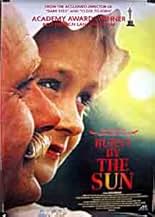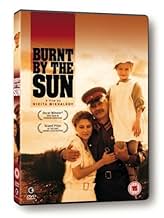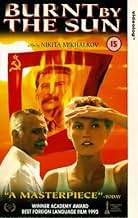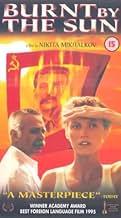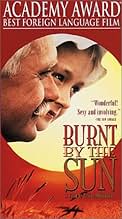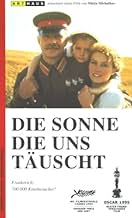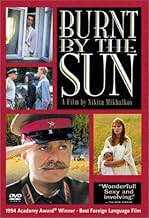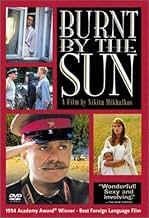IMDb-BEWERTUNG
7,8/10
16.838
IHRE BEWERTUNG
Füge eine Handlung in deiner Sprache hinzuIn the USSR in 1936, shadows of Stalin's repressions fall on a famous, revolutionary hero. The accusations of him being a foreign spy are nonsense, and everyone knows that. However, a slow p... Alles lesenIn the USSR in 1936, shadows of Stalin's repressions fall on a famous, revolutionary hero. The accusations of him being a foreign spy are nonsense, and everyone knows that. However, a slow process of his downfall has already started.In the USSR in 1936, shadows of Stalin's repressions fall on a famous, revolutionary hero. The accusations of him being a foreign spy are nonsense, and everyone knows that. However, a slow process of his downfall has already started.
- 1 Oscar gewonnen
- 4 Gewinne & 9 Nominierungen insgesamt
Ingeborga Dapkunaite
- Marusya
- (as Ingeborga Dapkunayte)
Nadezhda Mikhalkova
- Nadya
- (as Nadya Mikhalkova)
André Oumansky
- Filipp
- (as Andre Umanskiy)
Empfohlene Bewertungen
This is an interestingly broken-backed film. Set during the Stalinist era during one idyllic summer, it begins by contrasting the lives of Dmitriy (Oleg Menshikov) and Sergey (Nikita Mikhailkov) - the one a dilettante musician and pianist, the other a colonel in the Russian army and favorite of the premier. They both have a claim on Marusya (Ingeborg Dapkunaite): Srgey is married to her, and Dmitriy was a former lover of hers. It seems that the film's moral scheme is relatively straightforward: Dmitriy is talented but feckless, while Sergey seems virtually untouchable - not only does he have a great career, but he is happily married as well. However director Mikhailkov turns the tables on our expectations and thereby transforms BURNT BY THE SUN into a penetrating analysis of how dictatorships corrupt everyone around them. Concepts of 'good' and 'evil# no longer prevail: everyone simply does what it takes in order to survive. The ending is both shocking yet predictable. Visually speaking, the film contrasts the idyllic surroundings of Dmitriy's dacha with the behavior of the protagonists - it seems that no one can actively enjoy the delights of glorious summer weather, for fear of being discovered. Life at that time must have been precarious, with no one actually being sure as to what would happen to them next. BURNT BY THE SUN is slow-moving, but Mikhailkov's camera has an eye for telling detail and significant gestures. Definitely worth watching.
This movie is about the most desperate and tragic situation in the human life. This is when our life is determined by external forces. Even the most basic form of happiness - being with you family, enjoying your child - were impossible in the Russia of Stalin.
Sometimes I think about people who were borne 20 years before World War II in Germany, Poland or Russia. I wonder whether they had a feeling that the life was extremely unfair to them. The feeling that your fate was determined by the time you were borne in, and that you couldn't do anything at all to somehow change it. If Mitya, Kotov and Marusya would not die then, they would have to wait for 50 years to be able to truly understand what happened to them and who was to blame for it.
I was puzzled why Mitya picked up the phone and agreed to arrest Kotov. Why didn't he stop his suffering immediately, as he knew that he had no other option than ruining lives of the people he loved. Was it his hatred towards Kotov and the opportunity to take revenge for being expelled for 10 years? Was it the last hope that his love to Marusya would reverse her marriage?
After watched the film again & again I decided that he knew from the offset there was no way out. Mitya went to his old home because he wanted just one thing - to say farewell to his dream that the old times would ever return. The dream that made him betray his comrades in the 20th, and come back from France in the 30th.
I'm so happy that we live in freedom and that the iron curtain fell.
Sometimes I think about people who were borne 20 years before World War II in Germany, Poland or Russia. I wonder whether they had a feeling that the life was extremely unfair to them. The feeling that your fate was determined by the time you were borne in, and that you couldn't do anything at all to somehow change it. If Mitya, Kotov and Marusya would not die then, they would have to wait for 50 years to be able to truly understand what happened to them and who was to blame for it.
I was puzzled why Mitya picked up the phone and agreed to arrest Kotov. Why didn't he stop his suffering immediately, as he knew that he had no other option than ruining lives of the people he loved. Was it his hatred towards Kotov and the opportunity to take revenge for being expelled for 10 years? Was it the last hope that his love to Marusya would reverse her marriage?
After watched the film again & again I decided that he knew from the offset there was no way out. Mitya went to his old home because he wanted just one thing - to say farewell to his dream that the old times would ever return. The dream that made him betray his comrades in the 20th, and come back from France in the 30th.
I'm so happy that we live in freedom and that the iron curtain fell.
"Burnt by the Sun" is a powerful example of what a genuinely Russian movie can be when it uses the good sides of western film-making : a coherent plot, professional camera work, and freedom of expression, all things that were rare for the cinema of Soviet times. Of course, it is not surprising that it was made by Nikita Mikhalkov, one of the few Russian directors who achieved lasting world success during communism, and therefore he had the right contacts abroad to get a decent budget. Though, "Burnt by the Sun" is way better than Mikhalkov's pompous "Barber of Siberia", which was alloted more money than any other film in the history of Russian cinema.
In "Burnt by the Sun", Mikhalkov was able to give us a palpable feeling of the beauty and genius of Russia. The lighting is magnificent all the way through, and the ripe and wide wheat fields shine like gold. The action takes place in a cozy dacha among the birch trees, a house which seems to be the nest of a bunch of gentle and carefree eccentrics, all in an atmosphere that reminds pleasantly of Tchekov.
Yet, you can tell from the start that "Burnt by the Sun" is not going to be just a comedy, as the first scene opens on a man cutting his veins in a bathtub while the telephone is ringing. However, this first forewarning soon gets forgotten throughout most of the film, which keeps a warm, light-hearted, slightly nostalgic tone almost all the time. It is only towards the middle you realize that it starts looming slowly towards predictable tragedy, and this only gets obvious in the very last moments.
It turns out that the characters we see are all members of an old aristocratic family who were spared the horrors of the revolution because the younger daughter, Marusia, married a Red Army colonel, much older than she is. Thus, they keep on living as they ever did, playing cards, drinking tea from samovars, making private jokes in French. They even have a maid and a parrot. They seem totally oblivious of the reality around them. Except for innocent looking balloons with Stalin's face on them and a few parading pioneers, the communist regime is visible almost only through the presence of colonel Kotov, brilliantly played here by Nikita Mikhalkov himself.
Colonel Kotov impersonates a character very familiar to the Russian mentality : he is tall, strong, authoritarian, but at the same time protective, warm-hearted, charming and prone to jokes. He is about just as sympathetic as the gruff milkman with a heart of gold in "Fiddler on the Roof". Although he is a military, he is not the kind of guy you think as having blood on his hands. But of course Lenin and Stalin's aura over Russian people was also partly due to the fact that they represented strong and protective father figures.
The story takes a sudden turn with the arrival of an enigmatic character disguised as a Santa Claus in the middle of summer. He turns out to be known by everyone in the house, as he is the adoptive child of the late grandfather. In fact, he was Marusia's childhood companion, and her lover in the first place, but was evicted by Kotov, who protected henceforth the whole family from repression. It soon becomes clear that the man, called Mitya, has come to take revenge for his shattered life.
All performances here are good, even though Nikita Mikhalkov, as an actor, still manages to steal the show. But one will not either forget the performance of his then six-year old daughter Nadya , who also plays his daughter in the movie. A charming, energetic and witty child performance which impersonates the innocence of the family about to be lost.
The French title for the movie was "Deceitful Sun", and I find it more appropriate. Although the film bathes in quiet sunlight, it deals with one of the darkest eras of Russian/Soviet history : Stalinism. In the early 1930's, Stalin decided to eliminate much of the newly arisen communist elite whom he did not trust anymore, and hired former enemies of communism, or half-criminals, to eradicate his own official allies. Thus, colonel Kotov remains self-righteous and sure of himself almost until the end because he simply cannot believe that Stalin will not protect him.
Needless to say that "Burnt by the Sun" is one of the first Russian movies that deals so openly with the subject. A subject which still remains quite sensitive since millions of people had their lives shattered by those events. Unlike what happened for Nazism, it was not until the end of the communist regime that it was possible to discuss it openly, even though Stalin's deeds had already been condemned officially a long time before. Therefore, this superb drama is also the symbol of a historical breakthrough.
In "Burnt by the Sun", Mikhalkov was able to give us a palpable feeling of the beauty and genius of Russia. The lighting is magnificent all the way through, and the ripe and wide wheat fields shine like gold. The action takes place in a cozy dacha among the birch trees, a house which seems to be the nest of a bunch of gentle and carefree eccentrics, all in an atmosphere that reminds pleasantly of Tchekov.
Yet, you can tell from the start that "Burnt by the Sun" is not going to be just a comedy, as the first scene opens on a man cutting his veins in a bathtub while the telephone is ringing. However, this first forewarning soon gets forgotten throughout most of the film, which keeps a warm, light-hearted, slightly nostalgic tone almost all the time. It is only towards the middle you realize that it starts looming slowly towards predictable tragedy, and this only gets obvious in the very last moments.
It turns out that the characters we see are all members of an old aristocratic family who were spared the horrors of the revolution because the younger daughter, Marusia, married a Red Army colonel, much older than she is. Thus, they keep on living as they ever did, playing cards, drinking tea from samovars, making private jokes in French. They even have a maid and a parrot. They seem totally oblivious of the reality around them. Except for innocent looking balloons with Stalin's face on them and a few parading pioneers, the communist regime is visible almost only through the presence of colonel Kotov, brilliantly played here by Nikita Mikhalkov himself.
Colonel Kotov impersonates a character very familiar to the Russian mentality : he is tall, strong, authoritarian, but at the same time protective, warm-hearted, charming and prone to jokes. He is about just as sympathetic as the gruff milkman with a heart of gold in "Fiddler on the Roof". Although he is a military, he is not the kind of guy you think as having blood on his hands. But of course Lenin and Stalin's aura over Russian people was also partly due to the fact that they represented strong and protective father figures.
The story takes a sudden turn with the arrival of an enigmatic character disguised as a Santa Claus in the middle of summer. He turns out to be known by everyone in the house, as he is the adoptive child of the late grandfather. In fact, he was Marusia's childhood companion, and her lover in the first place, but was evicted by Kotov, who protected henceforth the whole family from repression. It soon becomes clear that the man, called Mitya, has come to take revenge for his shattered life.
All performances here are good, even though Nikita Mikhalkov, as an actor, still manages to steal the show. But one will not either forget the performance of his then six-year old daughter Nadya , who also plays his daughter in the movie. A charming, energetic and witty child performance which impersonates the innocence of the family about to be lost.
The French title for the movie was "Deceitful Sun", and I find it more appropriate. Although the film bathes in quiet sunlight, it deals with one of the darkest eras of Russian/Soviet history : Stalinism. In the early 1930's, Stalin decided to eliminate much of the newly arisen communist elite whom he did not trust anymore, and hired former enemies of communism, or half-criminals, to eradicate his own official allies. Thus, colonel Kotov remains self-righteous and sure of himself almost until the end because he simply cannot believe that Stalin will not protect him.
Needless to say that "Burnt by the Sun" is one of the first Russian movies that deals so openly with the subject. A subject which still remains quite sensitive since millions of people had their lives shattered by those events. Unlike what happened for Nazism, it was not until the end of the communist regime that it was possible to discuss it openly, even though Stalin's deeds had already been condemned officially a long time before. Therefore, this superb drama is also the symbol of a historical breakthrough.
You know, here, in Moscow, the critics do their best to show that Nikita Mikhalkov makes popular pictures which aren't to be considered serious. To hear that "The Barber of Siberia" is a stupid sentimental movie is quite common nowadays.
But the more time passes from his next in turn production, the more a "strange" effect seems to take place: his films at last are rated according to their true value and not to somebody's opinion about them. It is always hard to say that something new is really good, but some time later...
"Utoml'ennye Solntsem" is not a very emotional movie. I don't suppose you'd cry when watching it. But my opinion is that it's a brilliant one. It is historically authentic (I've studied that period of time quite carefully so I think I have a right to say so). And no-one on this site seems to notice the love story in the film, which actually brought about the whole tragedy (remember, Kotov made Mitya work for NKVD). It was marvellously played by Oleg Men'shikov (my favourite actor) and Ingeborga Dapkunaite, a remarkable Lithuanian actress. And Mikhalkov himself, of course - "Kot" means "cat", by the way. Many people endow him with the characteristics of Kotov which only shows that he played his role well. A good actor is always attributed his character's traits.
But still, for me the main feature of the film is the world of Mitya's soul created by Men'shikov. A young, talented boy with brilliant prospects is what Mitya was. He gets involved in the war, goes through many ordeals, then comes home and falls in love with the girl he knew from her very birth, Marousya. But their happiness is too short. He is given a choice: to work for NKVD or...to commit suicide. He's only 24, and he wants to live. But hope for future slowly disappears as life goes on, cruel and senseless. When Mitya appears on the dacha of Marousya's parents, his soul is almost a wreck. But the last chance is killed when he sees that, after a suicide attempt, after months of despair, Marousya has married Kotov and doesn't want to go through everything again. Therefore Mitya begins to fulfill his revenge.
But the more time passes from his next in turn production, the more a "strange" effect seems to take place: his films at last are rated according to their true value and not to somebody's opinion about them. It is always hard to say that something new is really good, but some time later...
"Utoml'ennye Solntsem" is not a very emotional movie. I don't suppose you'd cry when watching it. But my opinion is that it's a brilliant one. It is historically authentic (I've studied that period of time quite carefully so I think I have a right to say so). And no-one on this site seems to notice the love story in the film, which actually brought about the whole tragedy (remember, Kotov made Mitya work for NKVD). It was marvellously played by Oleg Men'shikov (my favourite actor) and Ingeborga Dapkunaite, a remarkable Lithuanian actress. And Mikhalkov himself, of course - "Kot" means "cat", by the way. Many people endow him with the characteristics of Kotov which only shows that he played his role well. A good actor is always attributed his character's traits.
But still, for me the main feature of the film is the world of Mitya's soul created by Men'shikov. A young, talented boy with brilliant prospects is what Mitya was. He gets involved in the war, goes through many ordeals, then comes home and falls in love with the girl he knew from her very birth, Marousya. But their happiness is too short. He is given a choice: to work for NKVD or...to commit suicide. He's only 24, and he wants to live. But hope for future slowly disappears as life goes on, cruel and senseless. When Mitya appears on the dacha of Marousya's parents, his soul is almost a wreck. But the last chance is killed when he sees that, after a suicide attempt, after months of despair, Marousya has married Kotov and doesn't want to go through everything again. Therefore Mitya begins to fulfill his revenge.
10Prozacc
Just saw this film as the closing class in my first term Russian language class. It's one of the ten best films I've ever seen. Our professor grew up in the Soviet Union and at the end (no spoilers, I promise) she had to leave because it was too familiar. I wasn't informed until afterwards that it was based on a true story, but it didn't matter. As I watched it I actually forgot that it was subtitled, and my memory of it now is as though it was in English. My point by saying that is that it was so real, so powerfully directed and acted, that the language barrier didn't matter one bit. Stunning film.
Wusstest du schon
- WissenswertesOne of four Russian films ever to win Academy Award for Best Foreign Language Film. The others are Krieg und Frieden (1965), Uzala, der Kirgise (1975) and Moskau glaubt den Tränen nicht (1980)
- VerbindungenFeatured in Namedni 1961-2003: Nasha Era: Namedni 1995 (1999)
- SoundtracksUtomlennoe solntse
Written by Jerzy Petersburski (as Ezhi Petersburgskiy)
Lyrics by Iosif Alvek (uncredited)
Performed by Mark Simkin (singer), Efim Vyshkin (violin), Aleksandr Bashkatov (bayan), and Viktor Agapov (guitar)
Played by an instrumental quartet during opening credits as a film's theme song
Top-Auswahl
Melde dich zum Bewerten an und greife auf die Watchlist für personalisierte Empfehlungen zu.
- How long is Burnt by the Sun?Powered by Alexa
Details
- Erscheinungsdatum
- Herkunftsländer
- Offizieller Standort
- Sprachen
- Auch bekannt als
- Burnt by the Sun
- Drehorte
- Produktionsfirmen
- Weitere beteiligte Unternehmen bei IMDbPro anzeigen
Box Office
- Budget
- 2.800.000 $ (geschätzt)
- Bruttoertrag in den USA und Kanada
- 2.302.338 $
- Eröffnungswochenende in den USA und in Kanada
- 60.074 $
- 23. Apr. 1995
- Weltweiter Bruttoertrag
- 2.313.461 $
- Laufzeit2 Stunden 15 Minuten
- Farbe
- Sound-Mix
- Seitenverhältnis
- 1.66 : 1
Zu dieser Seite beitragen
Bearbeitung vorschlagen oder fehlenden Inhalt hinzufügen

Oberste Lücke
By what name was Die Sonne, die uns täuscht (1994) officially released in India in English?
Antwort

